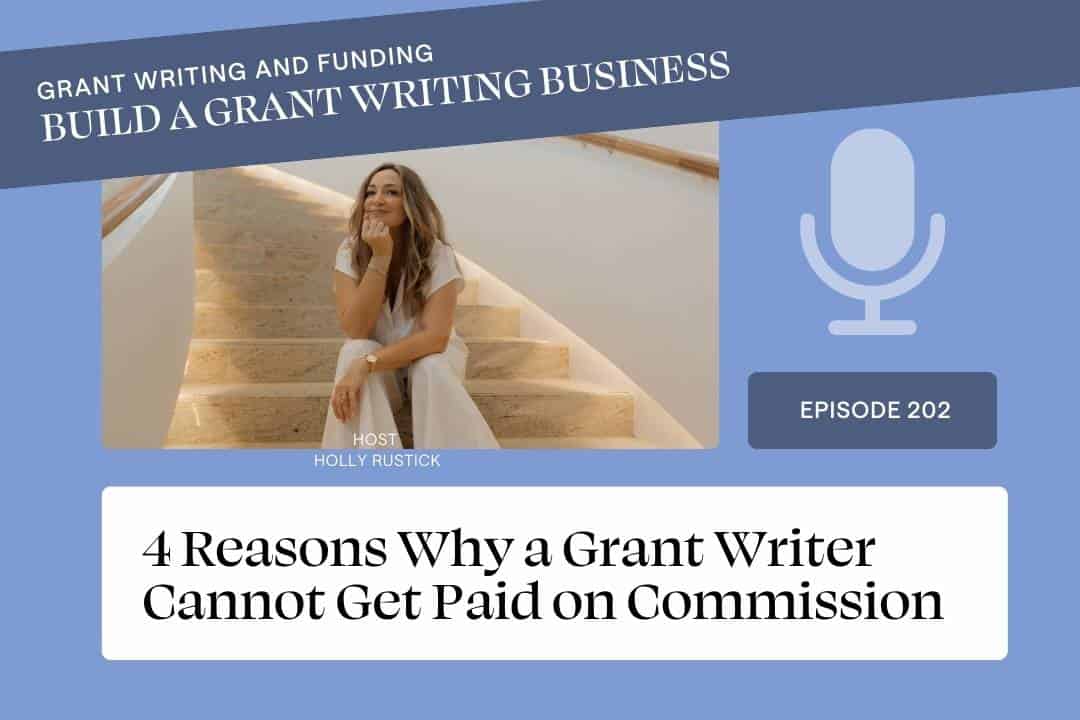4 Reasons Why a Grant Writer Cannot Get Paid on Commission

January 20, 2022
Grant writers cannot get paid to write grants on commission. This is one of the most popular urban myths of the grant writing world.
Nonprofit organizations innocently may believe that paying a grant writer on commission (i.e. paying a grant writer only if the grant is awarded from a percentage of the grant award) is the way to go.
The thought process for many nonprofit organizations on paying a grant writer on commission is that:
- They would not have to pay upfront (from their limited or no budget)
- The grant writer will work super hard to get the grant awarded (i.e. they only get paid if the grant gets awarded)
- Part of the awarded grant will pay the grant writer (i.e. no out-of-pocket expenses from the nonprofit)
How great is that? A nonprofit organization will be ecstatic as that seems like a win-win situation.
But nonprofit organizations cannot pay grant writers on commission.
Here are four reasons why grant writers cannot get paid on commission:
#1: Writing a Grant on Commission is Against Best Practices & Is Unethical
This is kind of a two-fer reason. But getting paid a percentage of the grant award is against the best practices of the grant writing community.
Some of the leading associations who prohibit writing grants on commission include the Association of Funding Professionals, Grant Professionals Association, and Grantsmanship Center, and here at Grant Writing & Funding.
The Grant Professionals Association stipulates against writing on commission on their Code of Ethics:
19. Members shall not accept or pay a finder’s fee , commission , or percentage compensation based on grants and shall take care to discourage organizations from making such payments.
This is important because of the nature of grants. Which include…
#2: Writing Grants on Commission is Against Federal & Accounting Guidelines
You may be writing a federal grant (and if you are not, then look to point #3), and think that you can include the payout for the grant writer in the budget.
According to the OMB Super Circular Uniform Guidance proposal costs are aligned with the Generally Accepted Accounting Principles (GAAP), and pre-award costs are very specific.
Stated within the Uniform Guidance (2 C.F.R. Part 200): 2 C.F.R Part 200 establishes uniform administrative requirements, cost principles, and audit requirements for Federal awards to non-Federal entities.
§ 200.458 Pre-award costs. “Pre-award costs are those incurred prior to the effective date of the Federal award or subaward directly pursuant to the negotiation and in anticipation of the Federal award where such costs are necessary for efficient and timely performance of the scope of work. Such costs are allowable only to the extent that they would have been allowable if incurred after the date of the Federal award and only with the written approval of the Federal awarding agency.”
The GAAP standards state that fundraising services should be paid “at the time services are provided.”

#3: Grant Budgets Cannot be Allocated For Pre-Award Costs (such as commissions)
This point is similar to #2, but discusses this in a different way. In point #2, we examined mainly why you cannot pay grant writers on commission according to accounting and cost principles.
Point #3 examines this from a logistical side of how grant budgets are designed. When creating a budget for a grant program, you design a budget for costs to (generally) create, operate, or expand a nonprofit's program. These budgets are generally for future projects (or expansion of programs).
Once the grant is submitted, it goes through a review process. If your grant makes it to the top for approval, you then enter into a grant agreement (contract) with the funding source. They are approving your budget from time of signature forward.
Well, writing the grant happened in the past. The grant writing is also not a future part of the program and each category in the budget is allocated for something specific.
For example, you write a budget for an animal shelter that amounts to $500,000. If you were to pay a grant writer 5% of the grant that got awarded, you would pay them $25,000. Which means you would have to take $25,000 out of the budget that has no line item to pay a grant writer (because it's unallowable – refer to point #2).
#4: Writing Grants on Commission is Unethical because a Grant is a Product
Once a grant writer has written a grant, they have created a product. This product is essentially a business plan that can be used for multiple funding advancements.
Plus, this takes a grant writer's time, technical writing experience, and grant writing knowledge. Many grant writers invest in grant writing courses and hone their skills over years.
Even if the grant proposal does NOT get awarded, it is still a product that can be repurposed for the following items:
- Resubmit to the same funding source next funding cycle (i.e. get feedback and edit the application and re-submit)
- Submit to other grant funding sources
- Submit for funding to corporate sponsors, etc.
- Use the copy from the grant for fundraisers, on websites, fliers, social media, etc.
Remember, a grant writer is creating a product. Whether the grant is awarded or not, the grant product can be utilized for many other funding ideas and strengthening partnerships.
If you are interested in becoming a freelance grant writer, and knowing how to navigate these types of issues, be sure to join our Freelance Grant Writer Academy.
Holly Rustick
Meet the author Holly Rustick
Work with Me
Write Grants, Get Paid.
Freelance Grant Writer Academy
Grant Professional Mentorship
JOIN OUR NEWSLETTER
Holly Rustick is a world-renowned grant writing expert and Amazon bestselling author.
Holly has been coaching grant writers how to run successful 5-6 figure businesses since 2017.
With two decades of grant writing and nonprofit experience, Holly is a popular keynote speaker for events all over the world, podcast host of the Top-Ranked Grant Writing podcast, a former university instructor, and is past president of the Guam Women’s Chamber of Commerce. She is constantly booked out to run trainings to help grant writers grow capacity, increase funding, and advance mission.
Love this post? You'll love these resources.
GET ACCESS NOW
Free Grant Writing Class
Get the proven 7 steps to eliminate anxiety and get Holly’s 20 years of secrets to start writing winning grants.
You will get the grant writing system that has helped Holly secure more than $25 million in grant funding and students earn more than $100,000,000 in funding for nonprofits around the world!
GET ACCESS NOW
Free 5-Step Checklist
OUR SPICY BELIEF IS THAT ALL GRANT WRITERS SHOULD START A BUSINESS, EVEN IF IT’S PART-TIME.
Work from home and have a massive impact on your community. Set up a grant writing business so you can start getting paid to write grants.